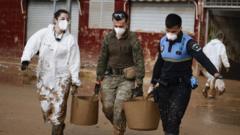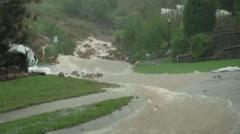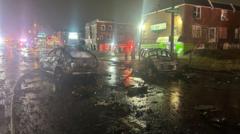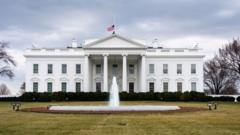The Valencia region grapples with immense sorrow and criticism as leader Carlos Mazón defends his administration amid protests following deadly floods.
Valencia Leader Concedes Flood Failures, Faces Calls for Accountability

Valencia Leader Concedes Flood Failures, Faces Calls for Accountability
Carlos Mazón acknowledges government missteps during catastrophic floods, vows to improve response.
On October 29, Valencia, a picturesque area of Spain, suffered catastrophic flooding that resulted in the loss of over 220 lives—most notably in the coastal suburbs where the disaster struck with ferocity. In the wake of this calamity, regional head Carlos Mazón has admitted his team made significant errors, yet he insists on his refusal to resign despite growing public frustration and demand for accountability.
During his first address to the regional parliament since the tragedy, Mazón faced backlash not only for the fatalities but also for spending critical hours dining with a journalist when prompt action was paramount. As floodwaters began to encroach upon the region, many were left unprepared due to a delay in alerts sent out by governmental agencies. The first warning only reached residents at 20:11, well after the floods had wreaked havoc.
In front of the parliament, discontent materialized in the form of protests. Chants of “El President a Picassent,” suggesting Mazón should face incarceration, echoed outside the assembly. Displaying anger and grief, demonstrators carried placards marked with stark messages including “Our hands are stained with mud. Theirs are stained with blood.”
Mazón directed blame toward the Aemet weather agency and the independent Júcar authority, which oversees river management, asserting that the early warnings issued, while severe, lacked the necessary detail for a swift local response. “We did our best with the information available,” he stated, attempting to justify the delays.
Survivors of the flood have described the aftermath as dire, with communities like Paiporta engulfed in mud and sewage, making daily life almost unlivable. Cleanup efforts are underway, but people like resident José Sánchez Maigallon lament the inadequate responses from both local and regional authorities. “If it weren’t for the volunteers, we would have died of hunger," he noted, highlighting the crucial role of community support in this time of need.
Amidst the chaos, Mazón defended his decision to wait until later in the day to visit the Operational Coordination Centre, relaying that regional officials were already present to handle the crisis. However, it was revealed that many, including regional interior minister Salomé Pradas, were not aware of the available warning systems designed to alert the public of impending dangers.
Undoubtedly, this tragic event has left deep scars on the Valencia region, fostering demands for more effective governance and clearer emergency protocols moving forward. As the community begins the path to recovery, many await decisive actions from their leaders to restore hope and ensure safety against future disasters.
During his first address to the regional parliament since the tragedy, Mazón faced backlash not only for the fatalities but also for spending critical hours dining with a journalist when prompt action was paramount. As floodwaters began to encroach upon the region, many were left unprepared due to a delay in alerts sent out by governmental agencies. The first warning only reached residents at 20:11, well after the floods had wreaked havoc.
In front of the parliament, discontent materialized in the form of protests. Chants of “El President a Picassent,” suggesting Mazón should face incarceration, echoed outside the assembly. Displaying anger and grief, demonstrators carried placards marked with stark messages including “Our hands are stained with mud. Theirs are stained with blood.”
Mazón directed blame toward the Aemet weather agency and the independent Júcar authority, which oversees river management, asserting that the early warnings issued, while severe, lacked the necessary detail for a swift local response. “We did our best with the information available,” he stated, attempting to justify the delays.
Survivors of the flood have described the aftermath as dire, with communities like Paiporta engulfed in mud and sewage, making daily life almost unlivable. Cleanup efforts are underway, but people like resident José Sánchez Maigallon lament the inadequate responses from both local and regional authorities. “If it weren’t for the volunteers, we would have died of hunger," he noted, highlighting the crucial role of community support in this time of need.
Amidst the chaos, Mazón defended his decision to wait until later in the day to visit the Operational Coordination Centre, relaying that regional officials were already present to handle the crisis. However, it was revealed that many, including regional interior minister Salomé Pradas, were not aware of the available warning systems designed to alert the public of impending dangers.
Undoubtedly, this tragic event has left deep scars on the Valencia region, fostering demands for more effective governance and clearer emergency protocols moving forward. As the community begins the path to recovery, many await decisive actions from their leaders to restore hope and ensure safety against future disasters.





















